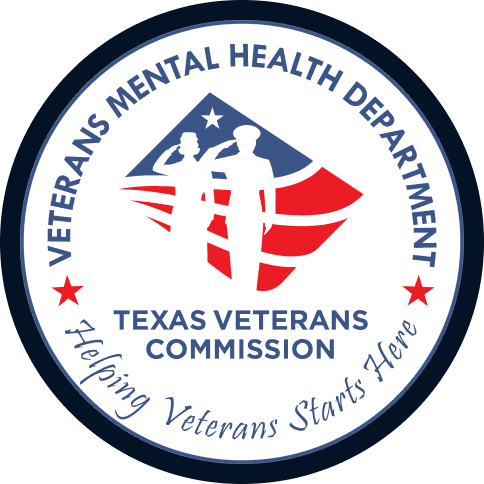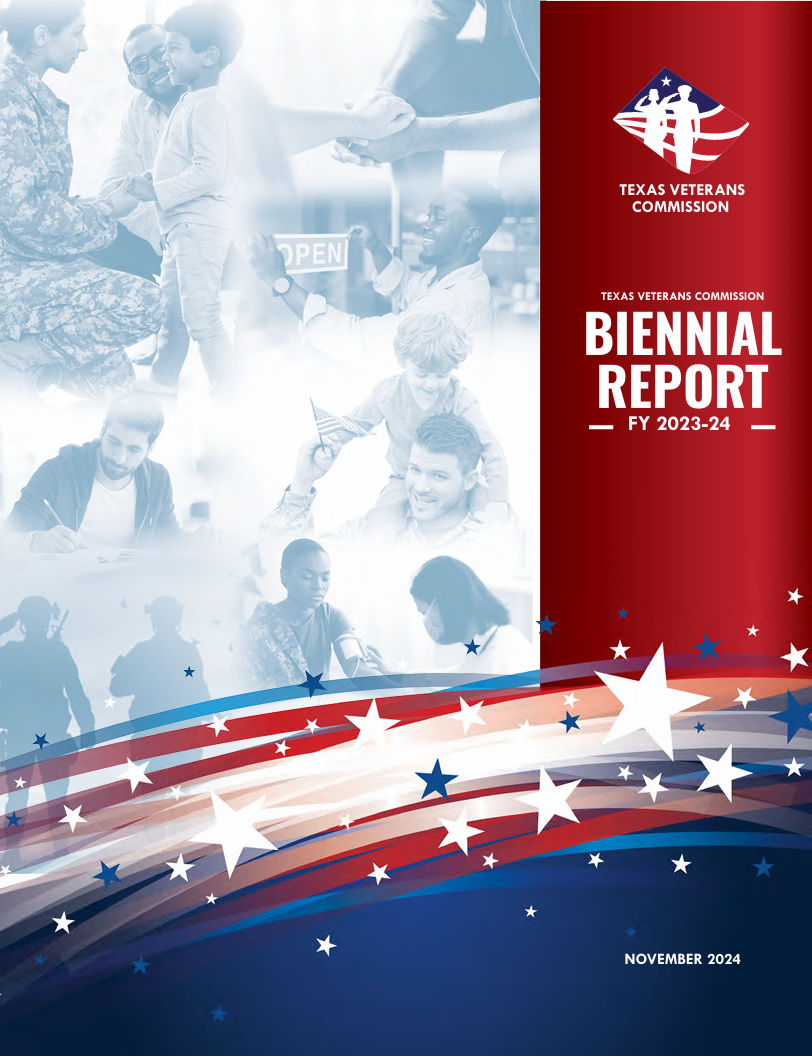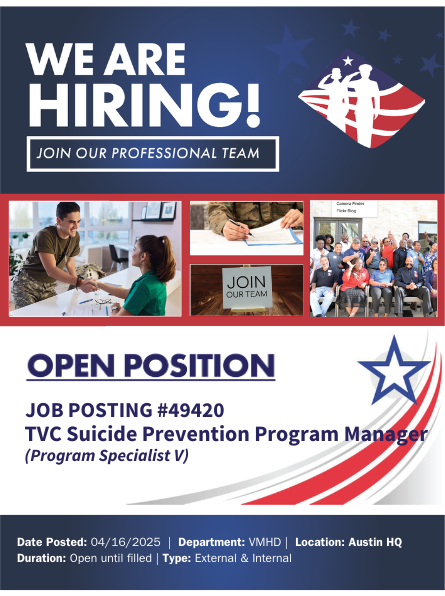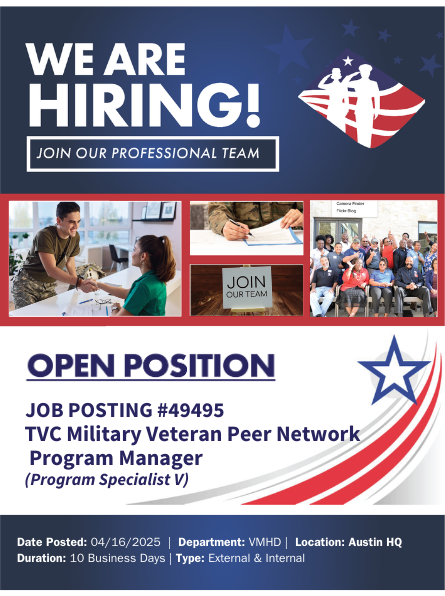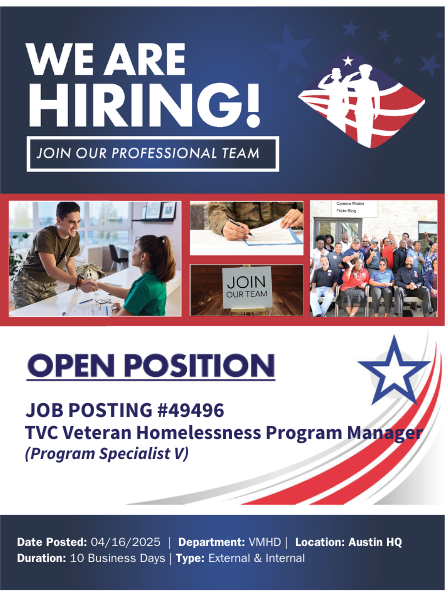Our Mission
The Veterans Mental Health Department (VMHD) is focused on ensuring access to competent mental health services for service members, veterans, and their families.
VMHD accomplishes this task by providing training, certification, and technical assistance across Texas.
In addition to connecting veterans in need directly to local services, VMHD also works with partners at the national, state, and local level to address veteran-specific issues including suicide prevention/intervention, veteran homelessness, military cultural competency, peer support services, military-related trauma, women and rural veterans, and justice involvement.
Across all programming, VMHD is fortunate to have the broadest definition of veteran regardless of discharge status, branch of services, or having served one day or a career. All services including training, technical assistance, and direct services provided across VMHD programming are offered freely to all who are in need.
How to Help
Veterans, Volunteers Health Providers
The Military Veteran Peer Network (MVPN) is made of TVC-Certified Peer Service Coordinators and their peer volunteers strategically placed within the local mental health authorities across Texas to create a statewide peer-to-peer network for any service member, veteran, or family member.
Register to join the MVPN and find your local chapter.
Who We Are
We work with partners at the national, state, and local level to address a wide variety of veteran-specific issues.
DR. BLAKE HARRIS
Licensed Clinical Forensic Psychologist
Director
Blake.Harris@tvc.texas.gov
(512) 676-1895
Amber Morson
Social Services Professional
VMHD Operations Manager
Amber.Morson@TVC.Texas.gov
(512) 567-5477
DR. BLAKE HARRIS
Licensed Clinical Forensic Psychologist
Director
Blake.Harris@tvc.texas.gov
(512) 676-1895
Veterans Mental Health Department
Phone:
(512) 463-6091
Email:
VMHD@tvc.texas.gov
REACH OUT TO OUR DEPARTMENT
Amber Morson
Social Services Professional
VMHD Operations Manager
Amber.Morson@tvc.texas.gov
(512) 567-5477
JAYNI WHITEFIELD
Army Veteran, M.S.
Peer Services Manager
Jayni.Whitefield@tvc.texas.gov
(737) 367-5408
CYNTHIA GRAY
Air Force Veteran, M.S. LPC-A
Justice Involved Veteran Manager
Cynthia.Gray@tvc.texas.gov
(512) 815-7906
TERRI WILLIAMS
Licensed Professional Counselor
Justice Involved Veteran Manager
Terri.Williams@tvc.texas.gov
(737) 237-4080
Services
All services including training, technical assistance, and direct services provided across VMHD programming are offered freely to all who are in need.

TECHNICAL ASSISTANCE

TRAININGS
We offer training to licensed mental health providers and organizations, community & faith-based organizations, and state agencies on the impacts of military-related trauma.

CERTIFICATIONS
FAQs
Get answers to Frequently Asked Questions here. Contact us for more information if you can’t find what you’re looking for.
What is the Veteran's Mental Health Department?
The Veterans Mental Health Department (VMHD) is a branch of the Texas Veterans Commission. The Veterans Mental Health Department is focused on ensuring access to competent mental health services for service members, veterans, and their families. We accomplish this task by providing training, certification, and technical assistance across Texas.
In addition to connecting veterans in need directly to local services, VMHD also works with partners at the national, state, and local level to address veteran-specific issues including suicide prevention/intervention, veteran homelessness, military cultural competency, peer support services, military-related trauma, women and rural veterans, and justice involvement.
What does the Veterans Mental Health Department do?
The Veterans Mental Health Department connects veterans to resources that assist them in receiving the services they need. These can include counseling referrals.
Is the Veterans Mental Health Department available to provide tailored training to organizations upon request?
Yes, the Veterans Mental Health Department is available to tailor specific training to an organization that serves veteran clients. Send us an email with your request, and we will get back to you to provide the training that meets your organization’s needs.
What is the cost of a Veterans Mental Health training cost?
What is the Justice Involved Veterans program?
The Justice Involved Veteran (JIV) Program is housed within TVC’s Veterans Mental
Health Department and its aim is to improve veteran services across the criminal
justice continuum. JIV Managers serve as a resource to provide technical assistance
and training to all Veteran Treatment Courts across Texas, partner with the local and
state law enforcement to deliver the officers relevant trainings such as trauma-affected
veterans and crisis intervention strategies. JIV Managers also collaborate with the local
jail and state prison systems to better ensure that incarcerated veterans have access to
veteran-specific services and programming.
Who is considered "Justice Involved"?
What trainings are offered by the JIV Program?
The JIV Program offers FREE trainings to Veteran Treatment Courts, Law Enforcement,
Community Supervision, Mental Health Providers, and Community Stakeholders.
Trainings include:
- Suicide Awareness & Prevention (CALM & AS+K)
- Military Cultural Competency
- Military-Informed Care
- Mental Health First Aid
- TCOLE 4067 Trauma-Affected Veterans*
- TCOLE 1850 De-escalation Techniques*
*Denotes Law Enforcement ONLY Trainings
How do we get more Justice Involved information?
You can reach out to the JIV Program directly at:
- Terri Williams, M.A., LPC, Terri.Williams@tvc.texas.gov, Cell: (737) 237-4080
- Cynthia Gray, Cynthia.Gray@tvc.texas.gov, Cell: (512) 815-7906
What is considered “homeless”?
An individual that has a primary nighttime residence that is public or private not meant for human habitation, a shelter designated to provide temporary living arrangements (to include transitional housing and hotels paid by a charitable organization), or is exiting an institution where they resided for 90 days or less and resided in one of the previous two living arrangements immediately before entering that institution.
What types of veteran status can the Homeless Initiative assist?
Any individual that has served in the U.S. military regardless of time in service and discharge status.
Do you know a homeless veteran, what can you do to help?
Any individual to include Family and loved ones can reach out on behalf of the veteran to help facilitate available local resources.
Providers
What does the Provider Training program do?
The aim of the Provider Training Program is to offer licensed clinicians and any mental health professionals with training and technical assistance aimed at promoting military cultural competency.
What types of trainings are offered for veteran providers?
Training is offered both online and in person to cater to different learning preferences and availability.
Where can I find the trainings for veteran providers?
The Texas Veterans Commission Mental Health department offers monthly trainings that are accessible to all interested providers.
How long does each training session last?
The duration of each training session may vary, but typically, sessions are designed to be comprehensive and last between one to three hours.
Is there a cost associated with attending these trainings?
The Texas Veterans Commission offers these trainings free of charge to support and enhance the skills of veteran providers across the state.
Can I receive continuing education credits for attending these trainings?
Yes, continuing education credits are available for these trainings to ensure that providers can meet their professional development requirements.
Are these trainings limited to providers based in Texas?
While the trainings are organized by the Texas Veterans Commission Mental Health department, they are open to providers from all states who are interested in enhancing their knowledge and skills in serving veterans.
Can I request specific topics to be covered in this training?
The Texas Veterans Mental Health department welcomes suggestions and feedback from providers. They strive to address relevant topics and meet the needs of their participants for serving Texas veterans.
How can I stay informed about upcoming trainings?
You can visit the Texas Veterans Commission Mental Health department and register on their website to receive updates about upcoming trainings and registration details and you fill out the training request form to receive additional information
A History Of Helping Veterans
VMHD is a branch of the Texas Veterans Commission. TVC was created in 1927 as the State Service Office to assist veterans of the Indian wars, Spanish-American War and World War I.
Homeless Veterans On the Street
Veteran Suicide Rate per 100,000

Why It Matters
Military trauma-affected SMVF often have difficulty accessing timely mental health resources due to factors, which include; an individual’s difficulty in recognition of their mental health needs, lack of resources available upon recognition of mental health needs, difficulty accessing mental health resources, and a lack of community-level awareness of military-related traumas resulting in mental health conditions.
The VMHD provides military trauma-informed training and technical assistance to create greater awareness of and access to mental health resources for SMVF.
Join Our Network
We provide training and technical assistance to agencies and organizations spanning the Texas Criminal Justice System in an effort to improve diversion and mental health treatment options for justice-involved veterans who have suffered military-related traumas.
Sign up today to become a volunteer.
How Are We Doing?
VMHD and TVC are committed to providing our Texas veterans and their families with superior customer service. Let us know how we are doing by completing a brief survey.
Find Help Now
To find and connect with a Peer Service Coordinator in your area click “Find Help Near You”.
